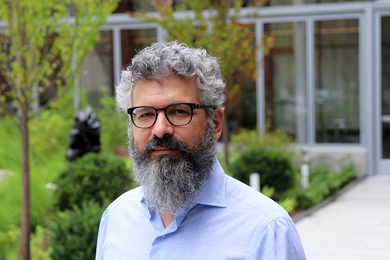This is President Charles M. Vest's charge to the graduates as prepared for delivery on June 7, 2002.
(Note: This is President Vest's entire speech as he had planned to deliver it, but he shortened his remarks due to the inclement weather.)
And so, here we are -- gathered once again in Killian Court to celebrate accomplishment, heritage, and passage.
We are surrounded by parents, family, friends, spouses, and children who have supported and sustained you through the years.
You will recognize them today by their smiles, brought about by their great pride in your accomplishments ... and, no doubt, by a sense of great relief to their bank accounts.
Let us, then, express our deep appreciation to all who have come to Cambridge today to join in your Commencement ceremony.
Will you, the graduates, please rise, turn to your audience, and give them the applause they so richly deserve.
Since you arrived at MIT, we have moved from the closing years of the 20th century into the opening years of the 21st. We have moved from predictions to realities. The end of science was proclaimed; the Internet bubble burst; and we suffered a national trauma at the hands of murderous terrorists.
Yet despite these predictions and these realities, this is a time to sustain opportunity and openness.
Despite the current problems in the world, I believe this is a time for optimism.
OPPORTUNITY
Let me begin with some thoughts about opportunity.
In 1996, John Horgan wrote a widely read book proclaiming the end of science. This was hardly a welcome announcement to anyone at an institution with science and engineering at its very core.
Science, of course, has not come to an end, even in the sophisticated sense Horgan discussed. Indeed -- to the contrary -- I firmly believe that we are entering the most exciting era in science and technology in human history.
Science is not ending. It is evolving. It is being transformed. Many boundaries between science and engineering are melting away in the face of rich new combinations of knowledge and tools.
This is a time when life sciences are looking once again at the questions of the whole ... at how things work at a systems level. It is a time when the physical, biological and chemical sciences are joining forces with information sciences and technology. It is a time when engineers, chemists, physicists, and materials scientists work together to create unimaginably small things. If the word in the 1960s was 'plastics,' the word today may well be 'nanotechnology' -- as we create new materials and devices using individual atoms and molecules as our building blocks.
This is also a time when we have the ability to observe the workings of the human brain with great precision -- and when we are developing new keys to understanding the human mind itself. Soon we will have computing capabilities that will enable us to accurately model the weather, the environment, and even biological systems. It is a time when information technology will become even more pervasive, but it also will become more human-centered and simple to use. And with these new blends of science and technology, this is a time when we will make extraordinary advances against human diseases, including those of the mind and emotions.
Thus, we are entering an era of unprecedented scientific and technological opportunity. You are part of this transformation. Indeed, many of you will make it your life's work -- placing science and technology in the service of humankind.
The end of science? Hardly. This is just the beginning.
And since we're talking about opportunity, what of the spirit of entrepreneurship?
We have lived through the height of the so-called New Economy. To many people, that meant an ever-expanding economy based on thousands of miraculous Internet companies. Many of these companies came ... and then they went.
In other words, we learned that the laws of economics had not been repealed. No perpetual motion machines, and no ever-expanding wealth creation without producing products of real value.
Nonetheless, this era has left us a powerful legacy -- a legacy of entrepreneurial spirit and experience, and a conviction that innovation will create enormous opportunity for you to build vibrant economies here and elsewhere in the world. I am confident that you will do so wisely and well.
Opportunity, then, is plentiful. Nonetheless, the thousands of deaths in New York, Washington and Pennsylvania as we began this school year, have changed our outlook in profound ways. Their ramifications will be with us for years to come.
The attacks of September 11 paved the way not only for a military response. They instantly changed our relationship with the rest of the world. They challenged our very concepts of citizenship, civil liberties and openness. We will all struggle with these matters together in the months and years ahead. They have no simple answers, and they hold grave dangers. But they also provide opportunities to think about how we might define and achieve the security of this nation -- and this world -- in new ways.
As we consider opportunity in the context of a post-9/11 world, we find ourselves asking questions that have arisen time after time in our modern history: To whom is opportunity available? How open should our society and institutions be?
OPENNESS
Each spring, my wife Becky and I host a dinner in our home for the men and women who are retiring from the tenured ranks of the MIT faculty. These are always extraordinary gatherings of talented and accomplished colleagues. These are the people who have defined MIT. Indeed, these are the people who have defined their scholarly and professional fields.
As I survey that room each spring, I realize how much MIT -- and indeed America -- have benefited from being open to people from other countries. I think how fortunate we are to spend our lives in an institution that is based on meritocracy -- that is, one in which people are selected and advanced based on talent and accomplishment rather than wealth or nationality.
Now some might say that this represents the passing of an era ... that I am simply observing the end of the intellectual migrations from Europe that were associated with the turmoil of World War II.
No, it is much more than that. The sustained excellence of our colleges and universities is due in very large measure to the fact that we have welcomed scholars from other nations. Take, for example, the members of the MIT faculty who have won the Nobel Prize. In recent years, our Nobel laureates included people born in Japan, India, Mexico, Italy and Germany. Most of them came to this country as graduate students.
Or consider our Institute Professors, the dozen or so faculty members who have achieved the highest rank at MIT. They were born in the United States, and in Belgium, Italy, Mexico, Israel and China.
The fact is that America has always been a nation of immigrants, and we have long been a land of opportunity. Those who have come from around the world to study here have contributed mightily to our society and to our institutions. Many have stayed and built our nation. Some have returned to the land of their birth, taking with them knowledge and skills learned here. They also have taken with them a better understanding of what is good in this country ... in its people ... in its democracy ... in its freedoms ... and in its institutions. And all have contributed to the quality of learning and experience of their fellow students that comes from campus diversity in all its dimensions.
As we in this country strive to make all who live here safe from those who would harm us, we should not let our fear close the door to our own opportunity. Let us recognize the cost to future generations if we were to become too zealous in tightening access to our colleges and universities.
One of the terrible realities of these times is that our openness and our technologies have been turned against us.
But we must not react by casting aside the very freedoms and openness that define what is good in America. Opening our great research universities to the very best students and scholars in the world is one of our best tools for spreading democracy, knowledge and human understanding throughout the world.
Up to now, our federal government has moved thoughtfully and judiciously in this regard. It essential that that they and the academic community continue to work together to enable sincere, talented students from around the world to pursue serious studies here. That is the American way.
And let us also resolve that our new technologies -- the Internet and the World Wide Web -- will be used as tools of empowerment and democratization on a global scale. Next fall, the MIT Faculty will launch its MIT OpenCourseWare initiative -- a program that will make the basic educational materials for 2,000 of our subjects available on the Web -- available to anyone anywhere free of charge.
Why would we do this? Because we see it as part of our mission: to help to raise the quality of higher education in every corner of the globe.
This program is based on the twin values of opportunity and openness. These are values that have made our universities and our nation strong. They are values that will keep our world safe and strong. And they are values that you should treasure and protect as you make your way in the world.
CHARGE TO THE GRADUATES
This, then, is my charge to you:
Take your education, your talent, and your energy, and build us a nation and a world community that consider knowledge a gift to be shared ... a healthy planet a place to be cherished ... and human dignity and opportunity fundamental conditions to be enjoyed by all people.
Men and Women of MIT, I wish you Godspeed and the very best of good fortune.





